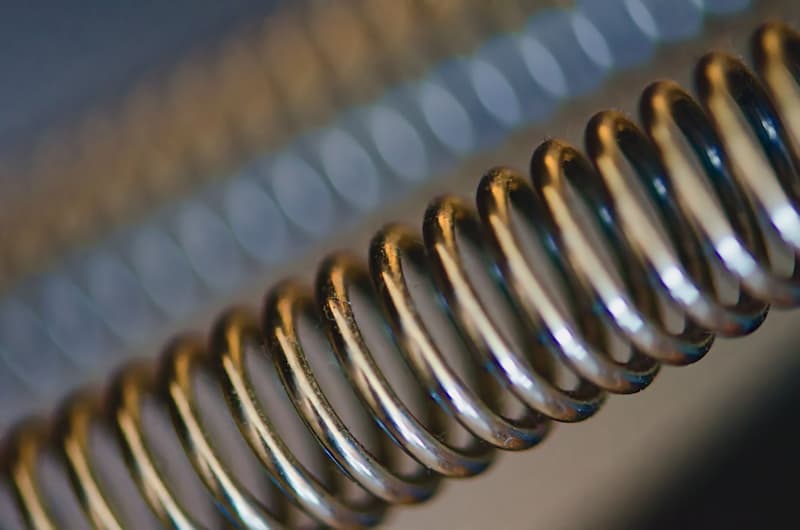What is Brass?
Brass is a metal alloy comprised of copper and zinc amongst other materials. The proportions of copper and zinc can vary, making it a versatile and adaptable material in spring manufacturing. For instance, a brass spring that has a higher zinc content will tend to be stronger, whereas brass that has a lower zinc content will be more malleable. Understanding the requirements of your spring application will help you in deciding which composition of brass to use in your springs.

What Makes Brass a Popular Material for Spring Manufacturing?
As spring manufacturers, we deal with a range of materials that all produce different results in springs. Brass is a popular material primarily because of its non-corrosive and conducting properties, making it an ideal solution for environments that deal with moisture or humidity.
Corrosion Resistance
One of the key advantages of brass springs is their high resistance to corrosion. Brass, in addition to copper and bronze, forms a protective layer when exposed to air and water. This makes them an ideal choice for industries that are exposed to moisture, high humidity, and harsh environments. Some metals are not suited to these kinds of environments, such as steel, which rusts and degrades over time, in comparison to brass which provides a long-lasting alternative.
This makes brass springs ideal for sectors such as the marine industry, where there is frequent exposure to corrosive elements such as saltwater, moisture and adverse weather. Springs made up of corrosive materials deteriorate quickly under these conditions, which leads to potential hazards and increased maintenance costs.
Electrical Conductivity
Brass additionally possesses electrical and thermal conductivity properties, making it suitable for springs used in electrical applications. Conductivity is a key property in electronics and refers to how easy it is for electrons to move under the influence of an electric field. Moreover, even though most metals can conduct electricity, there are only some that are suitable for industrial springs, including brass. This is due to other properties of the metal, such as ductility and strength.
Copper has the highest degree of conductivity out of any non-precious metal, making copper alloys such as brass especially suited to electrical applications. Moreover, the electrical conductivity of brass means that brass springs can be used in establishing consistent electrical connections in devices such as connectors, switches, and circuit boards. This contributes to enhanced reliability and efficiency in electrical applications.
Thermal Conductivity
Brass also has good thermal conductivity, meaning that it has an ability to transfer or conduct heat. This means that brass springs can manage and dissipate heat, which can be significant in things like automotive electrical systems, where overheating can have a detrimental impact. This can be beneficial in the long-term also, preventing consistent thermal damage overtime, keeping your machines and systems working well for longer.
In environments where temperature fluctuates heavily, brass springs maintain their mechanical properties, ensuring that their performance is consistent under varying temperatures. This is because brass has low thermal expansion compared to other metals, so that even if temperatures rise and fall, brass springs do not lose their shape or size. This reduces the risk of thermal damage, creating operations that are safe, dependable, and stable.
Airedale Springs: Experts in Brass Spring Manufacturing
At Airedale Springs, we pride ourselves in providing quality and innovative solutions. Our team uses advanced manufacturing techniques and high-grade materials to produce brass springs that are suited to your operational needs. Some areas where our brass springs thrive include:
Marine Industry
In the marine industry, consistent exposure to saltwater and harsh environmental conditions can have an extreme impact on the equipment being used. Despite this, springs are commonly used in the marine industry, especially within fishing equipment and boat mooring. Whilst a range of metals can be used for marine purposes because of their shared non-corrosive nature, brass is most used in pipes, marine fittings, and pumps. Our brass springs are designed to withstand the challenges of marine environments, providing reliable performance, and reducing the need for frequent maintenance.
Electrical Industry
Due to their electrical conductivity, brass springs are integral to the electronics sector. They hold a wide range of functions within electronics, such as circuit boards, connectors, and switches. In circuit boards, brass springs are used in applications that require flexibility with a stable connection. Brass springs can absorb mechanical stress without losing shape, meaning that connections remain stable despite pressure. Moreover, in switches and relays, brass springs are used to provide the force needed to close the circuit when the switch is activated, providing a quick and responsive action.
Brass Springs Manufactured at Airedale Springs
Depending on your project’s needs, we can construct brass springs that are suited to your needs, and provide you with safe, stable, and reliable results. We will work with you to manufacture springs that match your requirements and will fine-tune your springs so that they seamlessly integrate into your application. Whether it’s compression springs or tension springs, Airedale Springs are committed to delivering products that will be specifically tailored to your needs.
Brass springs have a range of uses that can benefit different applications and industries. Due to their unique composition, electrical and thermal conductivity, and resistance to corrosion, they are especially suited to marine and electrical industries but have further uses beyond this. The role that brass springs play in ensuring safety, means that you should not compromise on quality when it comes to selecting your spring manufacturer. Our spring manufacturing and design processes undergo rigorous testing and quality control, so you can be reassured that your brass springs meet the highest industry standards and crafted with precision. If you would like to discuss the creation of your own custom brass springs, speak to one of our experts today.

